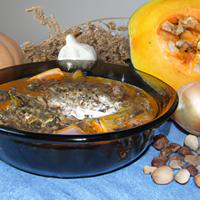
1 serving (200 grams) contains 80 calories, 2.0 grams of protein, 0.5 grams of fat, and 18.0 grams of carbohydrates.

Log this food in SnapCalorie

Nutrition Information
Calories |
94.1 | ||
|---|---|---|---|
% Daily Value* |
|||
| Total Fat | 0.6 g | 0% | |
| Saturated Fat | 0.1 g | 0% | |
| Polyunsaturated Fat | 0 g | ||
| Cholesterol | 0 mg | 0% | |
| Sodium | 11.8 mg | 0% | |
| Total Carbohydrates | 21.2 g | 7% | |
| Dietary Fiber | 3.5 g | 12% | |
| Sugars | 9.4 g | ||
| protein | 2.4 g | 4% | |
| Vitamin D | 0 mcg | 0% | |
| Calcium | 23.5 mg | 1% | |
| Iron | 0.6 mg | 3% | |
| Potassium | 470.6 mg | 10% | |
* Percent Daily Values are based on a 2,000 calorie diet. Your daily values may be higher or lower depending on your calorie needs.
Food Attributes
Source of Calories
About Pumpkin dish
Pumpkin dishes are versatile staples in various cuisines, from American autumn favorites like pumpkin pie to hearty African pumpkin stews and Southeast Asian curries. Typically made from fresh or canned pumpkin, these dishes often include spices such as cinnamon, nutmeg, and ginger, along with complementary ingredients like cream, broth, or grains. Pumpkin is rich in vitamins A and C, fiber, and antioxidants, which support eye health, immunity, and digestion. Its natural sweetness makes it a wholesome base for both savory and sweet recipes. However, some variants, such as desserts or creamy soups, can be high in added sugars and saturated fats, which may reduce their overall nutritional value. Choosing recipes with minimal added sugars and fats ensures that pumpkin dishes remain both flavorful and healthy. Whether roasted, pureed, or baked, pumpkin serves as a nutritious and delicious addition to seasonal meals.



